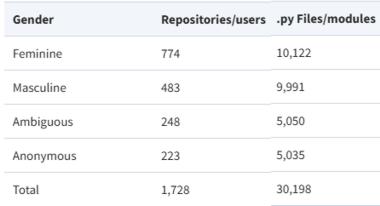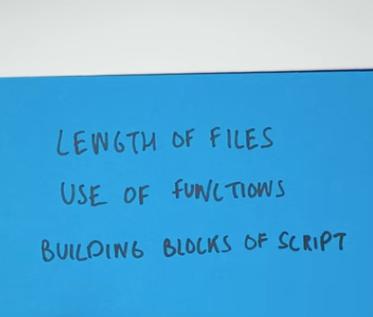| Gender Differences In Coding Style |
| Written by Sue Gee | |||
| Wednesday, 13 November 2024 | |||
|
A novel investigation into the gender gap between men and women regarding coding ability was undertaken by Dr Siân Brooke. Her conclusion? There is a difference in the Python code produced by men and women, but it is to do with coding style and doesn't affect code quality. Dr Siân Brook was affiliated to the Department of Methodology at the London School of Economics (LSE) and her paper, published in the February 2024 issue of the Journal of Computer-Mediated Communication is titled: Testing for Gender Differences in Python Programming Style and Quality on GitHub. It reports the results of an analysis of open source projects looking for differences between four gender categories: feminine, masculine, ambiguous, where gender could not be determined and anonymous where gender was deliberately concealed.
To make the topic more attention-grabbing, its abstract opens with a controversial statement:
The underrepresentation of women in open-source software is frequently attributed to women’s lack of innate aptitude compared to men: natural gender differences in technical ability.
This finding is attributed to Trinkenreich et al., 2021, a literature survey of 51 articles published between 2000 and 2021 that investigated women’s participation in OSS without making any comment about aptitude for programming in its abstract. Despite my misgivings that Brooke is being an agent provocateur, there is no denying that there is a very noticeable gender imbalance when it come to the number of programmers employed in major tech companies, as shown here in a screen from Brooke's video "Why are there so few women in tech?"
 In looking for projects to include Brooke used the following criteria:
In total 1,728 repositories consisting of 30,198 modules/“.py” files were included with this distribution across gender categories: Brooke analyzed the Python code by identifying subtle programming errors and unconventional coding practices using linting and also assessed adherence to style guidelines. She also measured gender differences in modular programming by focusing on the building blocks of code in the content of lines in Python files. The first set of results reported in the paper relate to module structure and include the following findings:
The second research question asked about a gender difference in Pylint scores and style checker components and here Brooke reported "a nuanced response" that can be summarised as: no significant gender difference in the overall quality of Python code. However, there is evidence of a gender difference in style... which indicate that it is feasible to predict the gender of users from the style of their code. In the final element of the analysis Brooke investigated whether the structure and style of modules could be used to classify users’ inferred gender. She used a Random Forest model to predict gender identity, using structural constituents and style checker components of Python modules and concluded that:
the gender of Python modules can be predicted based on programming style.
You can read the paper for some of the finer details and for an overview here's a video in which tackles the issue of the perceived gender gap in coding ability and provides her response based on her research: One point that emerges from the video is that the research shows that feminine and anonymous users have comparable coding styles, which Brooke claims implies that feminine users may choose to be anonymous on technical platforms in order to avoid harassment and having their work devalued. Her conclusion in the video is that: to see change we need to see social solutions
More InformationBrooke,S. (2023). Testing for Gender Differences in Python Programming Style and Quality on GitHub Related Articles Women In Tech - Towards Gender Parity Celebrating International Women's Day 2016 To be informed about new articles on I Programmer, sign up for our weekly newsletter, subscribe to the RSS feed and follow us on Twitter, Facebook or Linkedin.
Comments
or email your comment to: comments@i-programmer.info
|
|||
| Last Updated ( Wednesday, 13 November 2024 ) |




